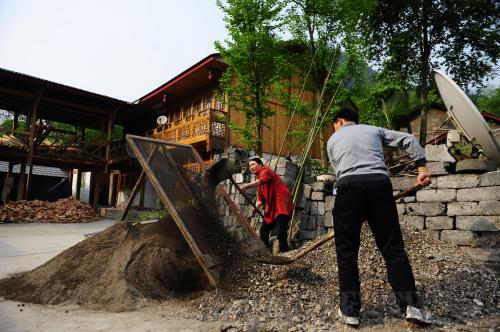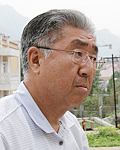|
 |
|
REBUILDING A HOME: Lin Xingcong and his wife Li Yunxiang work on the gate of their new house in Anxian County, Sichuan Province, on May 10 (XINHUA) |

Three years after the devastating Wenchuan Earthquake on May 12, 2008, in southwest China's Sichuan Province, I got the opportunity to visit the region.
The old seat of Beichuan Qiang Autonomous County, which was heavily hit by the earthquake, now serves as an earthquake memorial. The scars left by landslides on the mountain slopes there are still obvious. As our car approaches the old county, I see a bridge torn apart by the earthquake, and collapsed buildings here and there.
Debris is all over the campus of the old site of Beichuan Middle School. Most teachers and students of the school did not survive the earthquake. The flag pole is the only structure that still stands unscathed. In front of the pole is an altar that people built after the earthquake to display flowers placed in memory of the victims.
With a chrysanthemum in hand, I mourned the victims. I also mourned my fellow Japanese people who lost their lives to the catastrophic Tsunami that struck Japan on March 11.
In the meantime, I feel grateful. I am grateful to the Chinese Government and people who helped the Japanese people during the recent earthquake in Japan, and those who have sent cheering messages to Japanese people through the Internet and other media.
Human beings are vulnerable to natural disasters, which can instantly ruin the things we have painstakingly built. Love and helps between people in face of natural disasters are valuable.
Walking past the ruins of a residential area that used to be inhabited by people from the Qiang ethnic group, I see a building lying on its side, half of which is broken into pieces. The scene reminds me of the Osaka-Kobe Earthquake that struck Japan in 1995. One month after the earthquake, I visited the disaster-stricken area as a news commentator in Japan, where I was shocked by the destructive power of nature.
During my visit to the earthquake relics in Beichuan County of Mianyang City and Hanwang Town of Mianzhu City, I wondered how the people who lost family members in the earthquake have recovered from the trauma, and how the government has helped people to deal with it.
Zhao Meihai, 61, is a housewife I met during my visit. She now lives in a new building in Shouyangquan Village of Xinxing Town, Pengzhou City.
When recalling the earthquake, she said, "I was taking a nap at noon when the earthquake struck. That was the first time I experienced an earthquake. I raced out of the room. Now I sometimes have nightmares about earthquakes, which wake me up in middle of the night."
Zhao was very satisfied with her new home. Though she looked sunny, the shadow of the earthquake still lings in her heart.
"After the earthquake, we attached great importance to healing psychological wounds," said Guo Shanying, an official in Wenchuan County, Aba Tibetan and Qiang Autonomous Prefecture.
"In the three years after the earthquake, no villager in our county has committed suicide due to psychological problem," she said.
Kang Li, a staff member at the Psychological Health Center of Beichuan County, told us about common psychological problems caused by the earthquake, such as stress, insomnia, autonomic nervous system disorder and depression.
After the Wenchuan earthquake, psychological experts, doctors and government employees have formed joint groups, which periodically examine the mental health of people affected by the disaster, Kang said.
Strong interpersonal relations in local communities are conducive to post-quake psychological healing, said a Chinese psychologist in Beijing.
One reason for the smooth psychological recovery of earthquake-affected people in Sichuan is that the quake-hit region is in rural areas, where interpersonal ties tend to be strong, the doctor said.
In cities where interpersonal ties are usually not so close, it is especially important to follow up with the psychological status of disaster victims, the doctor added.
Other key factors contributing to psychological recovery of people in the quake-stricken area are sufficient food, houses and employment opportunities provided to local people, Kang said.
It is right to build houses first during the post-quake reconstruction, Kang said. In addition, employment opportunities have been provided to people who have given up farming after the earthquake.
Shuimo Town of Wenchuan County, which was ravaged by earthquake three years ago, now impresses visitors with its dazzling new buildings. Earlier in May, the Council of the Global Forum on Human Settlements granted to Shuimo the "Global Best Implementation of Post-Disaster Reconstruction" award.
Shuimo has shifted away from agriculture and polluting industries to eco-friendly tourism industry. Local residents have found new value in their lives. Its experiences are valuable to the reconstruction of the quake-stricken region in northeast Japan.
The author is a Japanese living in Beijing and working for People's China | 